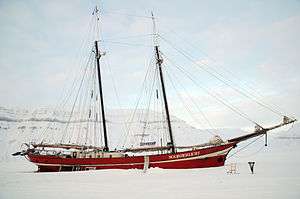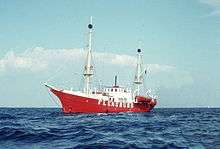S/V Noorderlicht
 Noorderlicht during the winter season, intentionally frozen in ice as an expedition base camp | |
| History | |
|---|---|
| Name: |
|
| Owner: |
|
| Operator: |
|
| Builder: | Flensburger Schiffbau-Gesellschaft |
| Yard number: | 300 |
| Launched: | April 1910 |
| In service: | 2 July 1910 |
| Out of service: | October 1963 |
| Identification: |
|
| Status: |
|
| General characteristics | |
| Class and type: | Schooner |
| Tonnage: | 140 GRT, 60 NRT, 250 DWT (155 GRT as built) |
| Displacement: | 255 t (251 long tons) (as built) |
| Length: | 46.20 m (151 ft 7 in) (36 m (118 ft 1 in) as built) |
| Beam: | 6.50 m (21 ft 4 in) |
| Draught: | 3 m (9 ft 10 in) |
| Depth: | 3.20 metres (10 ft 6 in) |
| Installed power: | 360 horsepower (270 kW) |
| Propulsion: | Sails and diesel engine |
| Sail plan: | Schooner |
| Speed: | 7 knots (13 km/h) |
| Capacity: | 20 passengers + crew |
| Armament: | 2 cm (0.79 in) anti-aircraft gun (1940) |
S/V Noorderlicht (Northern Light or Aurora Borealis) is a two-masted schooner, built in 1910 as a sailing light vessel for the German navy. Since the 1990s she has been operated as an expedition cruise vessel in the more remote locations in the Arctic region, particularly the Norwegian islands of Svalbard.
History

Noorderlicht is a steel two-masted schooner and was built in 1910 in Flensburg, Germany by Flensburger Schiffbau-Gesellschaft for the Imperial German Navy.[1] The ship was originally named Fs Kalkgrund II, rigged as a three-masted schooner and used as a light vessel (Feuerschiff) on the Kalkgrund station, off the Flensburg Firth, as well as functioning as a weather ship and pilot station.[2]
During World War II, by then in service of Nazi Germany's Kriegsmarine and renamed Flensburg, the middle mast was taken out to improve stability. An anti-aircraft gun was also fitted. After the war the ship continued in service as a light ship until retired in 1963 on commissioning of a new lighthouse.[2]
Between 1963 and 1992, the ship had a number of owners, being used as a workers' hostel and, from 1967 until 1986, as a clubhouse for the sailing association Möltenorter Seglerkameradschaft at Heikendorf, then sold to the Netherlands.[2][3] In 1991 Flensburg was found in Leeuwarden, Netherlands by the current owners, Ted van Broeckhuysen and Gert Ritzema and they had the ship re-rigged, restored and equipped with an auxiliary engine. After renaming as Noorderlicht, the ship entered service as an adventure cruise vessel and since 2011 has been operated by Oceanwide Expeditions, Vlissingen and Basecamp Spitsbergen, Longyearbyen.
Cruise vessel
Noorderlicht's schedule is based at Longyearbyen, Svalbard, with voyages within the archipelago, the Lofoten islands and to mainland locations, all within polar regions. Ten cabins provide accommodation for up to 20 passengers, and two rigid-hulled inflatable boats are carried to enable the viewing of wildlife in otherwise inaccessible places.
In winter Noorderlicht is intentionally frozen-in at Tempelfjorden, Svalbard, to provide base-camp accommodation for arctic journeys.[4]
References
- ↑ Gröner 1988, pp. 239–241.
- 1 2 3 Klempau, Iris. "Feuerschiff Kalkgrund II". Feuerschiffe in aller Welt (in German). Retrieved 24 December 2013.
- ↑ "Chronik" (in German). Heimdorf: Möltenorter Seglerkameradschaft. Retrieved 24 December 2013.
- ↑ Rushby, Kevin (6 November 2010). "A hotel like no other in Arctic Norway". The Guardian. Retrieved 24 December 2013.
Bibliography
- Gröner, Erich (1988). Die deutschen Kriegsschiffe: 1815-1945 - Hilfsschiffe II: Lazarettschiffe, Wohnschiffe, Schulschiffe, Forschungsfahrzeuge, Hafenbetriebsfahrzeuge. 5. Koblenz: Bernard and Graefe. ISBN 3-7637-4804-0.
External links
![]() Media related to S/V Noorderlicht at Wikimedia Commons
Media related to S/V Noorderlicht at Wikimedia Commons
- History of Noorderlicht at Noorderlicht.nu
- S/V Noorderlicht at Oceanwide Expeditions
- S/V Noorderlicht at Marinetraffic.com